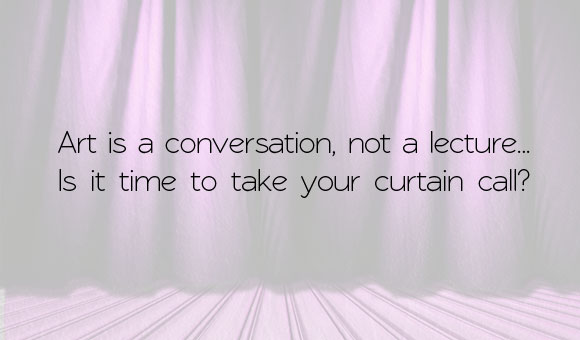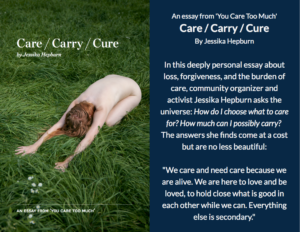In my not-so-past life, I was a professional actor. I’m resurrecting one of the most powerful lessons I learned early in my career…
Actors love to tell their “war stories.” It’s a form of entertainment and quick communion for those who are constantly thrust into unknown surroundings with new colleagues. These tales often have a witty moral like, “And that’s why you should never Velcro a corset.”
But my biggest battle scars leave me with the most important lesson I have learned about art and community, and it all happened in a high school gymnasium in rural Virginia.
Our small cast was accustomed to performing for middle school and high school audiences, and was adept at handling The Noisy Crowd, The Inattentive Crowd, The Unsupervised Crowd. We had a great deal of respect for the show we were doing (a Holocaust play told through the eyes of two survivors), and the audience, though often rowdy and hostile at the outset, was usually silent and captivated by the end.
But not this spring afternoon.
As the school had no theatre space, the student body cavorted into the gym for the performance. What followed was an actor’s nightmare. The noise level approximated that of a pep rally as students lounged in each other’s laps. The teachers apparently took the hour out of the classroom as an hour of vacation and chatted with each other on the sidelines. Soon the kids grew bored with talking amongst themselves and directed their attention to the actors; “Take it off!,” “Jew!,” and “You’re going to burn!” were among their shouts.
The actors’ response? Anger, humiliation, determination. We were determined that these kids would listen and understand the message of this great story we had to tell. We tried to yell over them, we tried staring them down and chastising them with disciplinary expressions. Nothing worked.
That particular cast and play had several ingredients to what makes good theatre. Most importantly, there was a need to communicate; there was a message about the human condition and a drive to share it.
Secondly, the actors were there to serve the audience. We have all seen the actor who is on stage seeking some type of self-fulfillment that never extends beyond the footlights. That’s not art; it’s poorly devised therapy.
But what this cast was missing was the understanding that art is something that must be shared. It must be shared by willing participants. A play is an event and the actors are the invitation to partake in a once in a lifetime opportunity. If the invitation is denied, so be it (I fully believe that I could have sprouted wings and flown figure eights around the basketball goal and not a student would have been intrigued).
Art is a conversation, not a lecture. And in my mind, business is art.
I doubt your online business will ever experience anything like the “Jews” in Norfolk County, but remember this: if you feel like you have to fight to be heard or yell above the noise, calmly take your curtain call and move on the next town.
And our show? We packed up and got out of there as fast as we could. After that performance, we instituted a new tradition: when an audience showed up and went on the uncomfortable journey of the Holocaust story with us…we applauded them.
ED: Can you relate to Laura’s story? Has there been a time in your life when you felt like the Jews of Norfolk County yelling at an indifferent audience-maybe you are there right now? Please share with us in the comments, we’ll applaud you!


